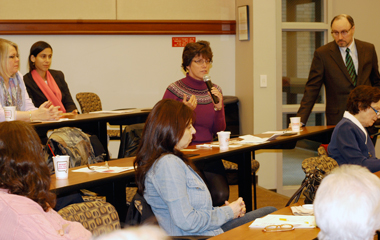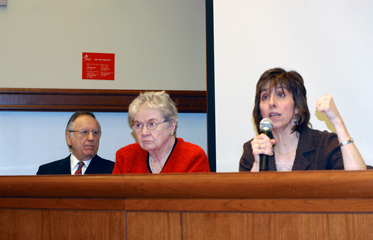by Marie Elena Giossi

With the Reproductive Health Act pending in New York State, the radical measures proposed in the act and actions that can be taken to oppose it were the topic of a panel discussion at St. John’s University Law School, Jamaica, March 4.
Titled “What You Need to Know about the ‘RHA’ Act and What It Would Do,” the two-hour presentation was part of the annual Catholic Speakers Series, cosponsored by the Joint Parish Respect Life Committee (JPRLC) of Queens and the diocesan Faith Formation Office.
Speaking on the issue were three panelists, Kathleen Gallagher, pro-life activities director, N.Y.S. Catholic Conference; Barbara Meara, chairperson, N.Y.S. Right to Life Committee; and former N.Y.S. Sen. Frank Padavan.
First introduced as the Reproductive Health and Privacy Protection Act in 2007, the bill was intended to go beyond Roe v. Wade by guaranteeing a fundamental right to abortion with no restrictions.
In the 2011-2012 legislative session, a new version of the bill (S. 2844/A. 6112) was introduced by State Sen. Andrea Stewart-Cousins (D-Yonkers) and Assemblywoman Deborah Glick (D-Manhattan).

Aided by a PowerPoint presentation, Gallagher addressed several aspects of the bill, which would establish abortion as a basic right under New York law, something Gallagher noted is “unnecessary” since the state already has the nation’s highest abortion rate.
“Show me where … anyone is having trouble finding an abortion in New York State,” Gallagher argued.
In fact, panelists noted that a new abortuary is opening in Queens this week. Choices Women’s Medical Center is relocating from Long Island City to a larger site in Jamaica, where clinic executives have said they hope to provide 10,000 abortions a year.
The bill would allow for late-term abortions, up to nine months of pregnancy, if deemed necessary to protect the mother’s life or health, which, in this case, could include emotional, economic and social well-being.
Concerning women’s safety, the bill would allow any licensed health care practitioner, not just physicians, to perform abortions.
Regulations such as parental notification for abortions performed on minors, informed consent on the procedure’s risks, and restrictions on taxpayer funding would also be removed.
Furthermore, RHA offers inadequate conscience protection for religious hospitals, agencies and individuals refusing to provide abortion-related services.
Fighting measures such as these begins on the local level, said former Sen. Padavan. He urged attendees to visit their local legislators’ district offices and make their voices heard.
“Whether you’re a Democrat or Republican,” he said, “support the person you feel will support these (pro-life) issues.”
Pro-life attitudes are gaining ground according to Meara, who spoke about a “pro-life tide sweeping the nation.” She noted that more pro-life laws are being passed and several states have or are in the process of enacting laws requiring ultrasounds before abortions.
To further that trend in New York, panelists suggested attendees become better informed on life issues by regularly visiting pro-life websites and joining the N.Y.S. Catholic Conference’s Catholic Action Network, through which they can e-mail legislators regarding RHA and other pro-choice measures.
Attending the upcoming Public Policy Day on March 13 at the Capitol is another way to show support.
Closing the event, Dr. Florence Maloney, JPRLC chairperson, told the crowd, “There are so many people who seem not to be informed. It really is up to you and me to get out the truth, person to person.”
